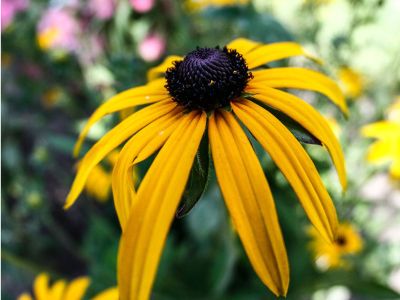Perennials for Northern Gardens
Perennials in North Central states like North Dakota, Wisconsin, and Illinois must be able to survive long, cold winters and hot summers. Between native plants that naturally thrive in this region and others that grow in similar climates around the world, there are plenty of options to choose from:
Purple coneflower: Also known as Echinacea, this is a solid and reliable perennial great for beginner to advanced gardeners. They are largely trouble free and produce large, purple flowers with cone-shaped centers in the summer.Black-eyed Susan: Black-eyed Susan is another popular and striking flower. The sunny yellow, daisy-like blooms cheer up any bed or natural meadow. They will bloom through summer and into early fall.Daylily: Daylilies are low maintenance and come in a number of colors and thrive in the Midwest. You’ll even find them growing along roadways throughout the region.Butterfly weed: This is another low maintenance plant that will thrive in your sunny beds. Butterfly weed produces cheerful, bright orange and yellow flowers, attracts pollinators, and is not tasty to deer.Queen of the prairie: This striking perennial tolerates moist soil so it can be used in some of your low-lying beds or in rain gardens. The small pink flowers of queen of the prairie grow in dense clusters that give off a delicious fragrance.Hostas: Although they produce flowers, hostas are known more for their varied and pretty foliage. You can find varieties that are solid, lime green, striped, and that are massive or diminutive. These easy plants grow well in partial shade.False indigo: False indigo or Baptisia is a tough plant that doesn’t need much support or maintenance. It is native to the prairies and produces spikes of lavender-blue flowers reminiscent of lupine. These flowers will attract butterflies, hummingbirds, and bees.Woodland phlox: Create a pretty carpet of flowers with woodland phlox. The flowers can range from blue to lilac to pink.
Planting and Growing North Central Perennials
You can plant your cold-tolerant perennial flowers in spring or early summer. Dig and turn over the soil in the bed or planting area first, amending it if necessary, to ensure the spot will drain well and is fertile enough. After planting the perennials, consider putting down mulch to control weeds and keep moisture in the soil during the hot summer months. Different plants will have different watering needs, but many perennials, once established, only need watering when rain is scarce. Ongoing maintenance for most perennials includes deadheading (removing spent flowers), adding fertilizer once or twice a year, weeding around the plants, and staking plants that are tall and need extra support.
